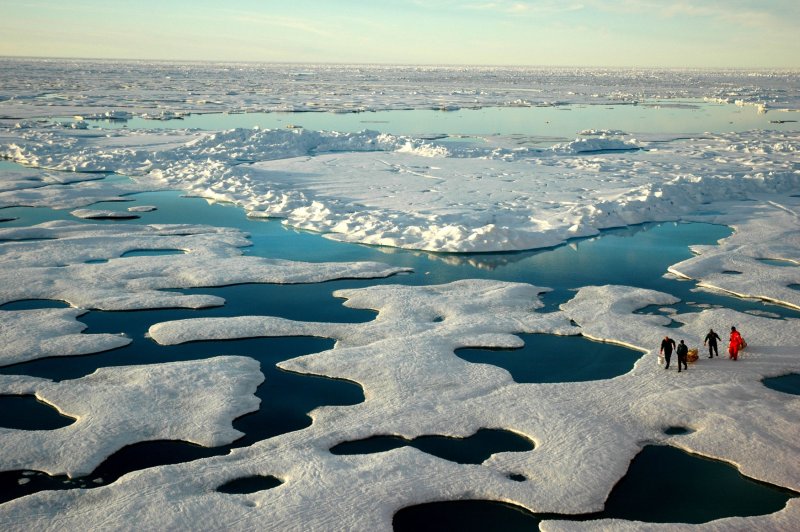Scientists tread carefully through a seemingly endless landscape of ice, sea, and meltwater in the Canada Basin of the Arctic on July 22, 2005. The blanket of ice coating Earth's northernmost seas was thin and ragged in July, setting a record low for sea ice extent for the month. Sea ice stretched across only 3.06 million square miles whereas the long-term July average is 3.9 million. Scientist note that this breakup of ice is a result of global warming. Photo made from the U.S. Coast Guard Icebreaker Healy. UPI/Jeremy Potter/NOAA |
License Photo
LONDON, Nov. 11 (UPI) -- Rising energy demands could result in irreversible global warming by 2017 without strict new standards, an energy watchdog group said this week in London.
The International Energy Agency said in its latest World Energy Outlook, released Wednesday, that a "remarkable" 5 percent jump in global primary energy demand last year pushed greenhouse gas emissions to a new high due to the rebound of the world's economies following the 2008 financial crisis.
And that, it said, bodes ill for efforts to reach a long-term target of limiting the global average temperature increase to 2 degrees Celsius above pre-industrial levels -- especially with moves by governments to shift resources away from developing clean energy technologies as more economic problems arise.
"Without further action by 2017, the energy-related infrastructure then in place would generate all the CO2 emissions allowed" to keep the temperature rise at 2 degrees or lower, the report said.
"Governments need to introduce stronger measures to drive investment in efficient and low-carbon technologies," Maria van der Hoeven, IEA executive director, said in a statement accompanying the report.
"The Fukushima nuclear accident, the turmoil in parts of the Middle East and North Africa and a sharp rebound in energy demand in 2010 which pushed CO2 emissions to a record high, highlight the urgency and the scale of the challenge," she warned.
The IEA modeled three different scenarios of the world's energy future, including a central "new policies" scenario that assumes recent government commitments are implemented in "a cautious manner."
Under those assumptions, it said, "the world is on a trajectory that results in a level of emissions consistent with a long-term average temperature increase of more than 3.5 degrees Celsius. Without these new policies, we are on an even more dangerous track, for a temperature increase of 6 degrees Celsius or more."
"As each year passes without clear signals to drive investment in clean energy, the 'lock-in' of high-carbon infrastructure is making it harder and more expensive to meet our energy security and climate goals," warned IEA Chief Economist Fatih Birol.
European Commissioner for Climate Action Connie Hedegaard echoed the concerns, saying, "One wonders how many more worrying figures the world needs.
"The World Energy Outlook 2011 shows that the world is heading for a fossil fuels lock-in. This is another urgent call to move to a low-carbon economy by using the right incentives: carbon pricing, cuts in fossil fuel subsidies, more renewables and energy efficiency, and smarter ways of taxing."
The report comes as the world's nations prepare to attend the next round of U.N. climate talks this month in Durban, South Africa.
The Kyoto protocol -- the world's only binding international agreement on emissions -- is set to expire next year, but the negotiations to extend it are going slowly. Britain, Japan and Russia, among other nations, have voiced support for postponing it until 2018 or 2020 due to opposition from the United States, China and India, The Guardian reported.
The IEA's Birol told the newspaper that would be too late.
"I think it's very important to have a sense of urgency -- our analysis shows (what happens) if you do not change investment patterns, which can only happen as a result of an international agreement," he said.















